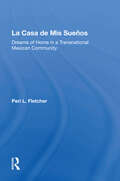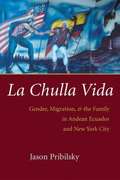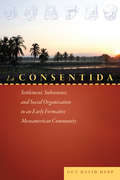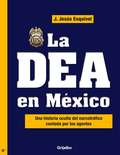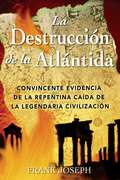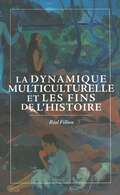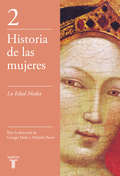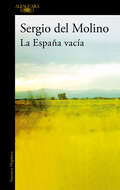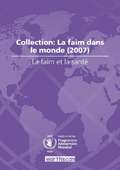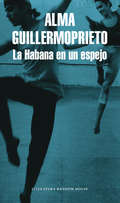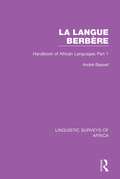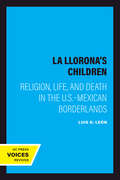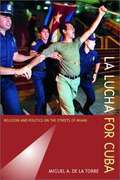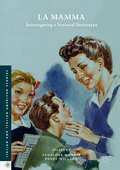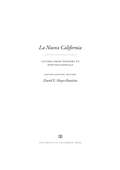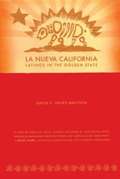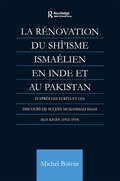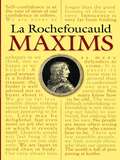- Table View
- List View
La Buenos Aires de Gardel
by Osvaldo Barsky Julián Barsky¿Cómo era la ciudad donde se formó Carlos Gardel? ¿En qué consistió esefascinante y misterioso mundo urbano de principios del siglo XX? ¿Cómose construyó aquel universo cultural en el que llegaron a convivir eltango y la ópera, el sainete y la zarzuela, los Podestá e IsadoraDuncan? Entre 1870 y 1920 el traslado de una gran población europea y delinterior hacia Buenos Aires generó una ciudad cosmopolita donde tomórelevancia el tema de la identidad nacional. En el campo musical, lasíntesis creativa fue el tango, y su forma cantada integró no solo unaforma nueva de interpretación, sino también una poética en gestación. Elmérito de este fenómeno correspondió esencialmente a Carlos Gardel. Peroeste artista es inseparable de una ciudad en construcción, en términosinfraestructurales y edilicios, sociales y estéticos. Este proceso es elque ilustra el presente libro. A partir de allí, ya no hubo Buenos Airessin Gardel, quien la dotó de su máxima identidad musical y cultural.
La CIA, Camarena y Caro Quintero: La historia secreta
by J. Jesús EsquivelUn libro explosivo que aporta las claves definitivas para esclarecer un suceso que definió la historia del narcotráfico en México: el asesinato del agente de la DEA Enrique Kiki Camarena, en febrero de 1985. Se trata de un caso emblemático que pone en evidencia la forma en que el crimen organizado adquirió un poder prácticamente ilimitado en nuestro país, gracias a la complicidad urdida con policías, militares y funcionarios públicos, algunos de ellos aún en activo.Por medio de las confesiones de tres testigos que integraron las filas del entonces pujante cártel de Guadalajara, J. Jesús Esquivel ofrece un recuento inédito de las actividades criminales de capos de la talla de Ernesto Fonseca Carillo, Juan José Esparragoza, el Azul, Rafael Caro Quintero, señalados como coautores de la muerte de Camarena. Asimismo, da a conocer el testimonio completo del agente Héctor Berrellez -encargado de investigar el homicidio en la llamada Operación Leyenda-, quien confirma que la propia CIA habría estado detrás del crimen.En tal contexto, a lo largo de estas páginas se revelan datos, nombres y momentos que explican las perspectivas de la trágica relación entre México y Estados Unidos, atrapada en las telarañas de la corrupción por la producción, el tráfico y el consumo de drogas. Así, no obstante que la investigación nos cuenta las tribulaciones de una sociedad tan lejana como la de los años ochenta, remite y desentraña un presente de mayor tormento.
La Cacería
by Mirta OjitoLa verdadera historia del asesinato de un inmigrante que transformó un acogedor pueblo de Long Island en la zona cero de la guerra contra la inmigración. En noviembre de 2008, Marcelo Lucero, un inmigrante Ecuatoriano de treinta y siete años, fue atacado y asesinado por un grupo de adolecentes cuando caminaba por las calles de Patchogue. Los atacantes iban a cazar beaners término despectivo para Latinos algo que formaba parte de su diversión habitual. Mientras el país lucha contra el creciente número de inmigrantes indocumentados y los políticos avanzan su carrera canalizando y propagando el odio al inmigrante, los latinos se han convertido en el blanco de múltiples ataques de odio. Lucero, un humilde trabajador de una tintorería, se convirtió en otra víctima de esta fiebre anti-inmigratoria. Tras su muerte, Patchogue, un tranquilo y casi desconocido suburbio Estadounidense, se convirtió en la zona cero en la guerra contra la inmigración y Lucero en un símbolo de todo lo que no funciona en nuestro sistema migratorio: menos visas para viajar a Estados Unidos, fronteras porosas, pocos buenos trabajos y un grave aumento de la intolerancia y el racismo. Basado en entrevistas de primera mano, Mirta Ojito periodista que compartióun Pulitzer de equipo en The New York Times ha elaborado un profundo retrato de una comunidad que intenta enfrentarse al odio y al miedo que yace bajo su idílica imagen. Con el compromiso de contar todos los lados de esta historia, Ojito ofrece una apasionante narración y una visión aguda e indispensable sobre uno de los problemas más acuciantes en los Estados Unidos de hoy.
La Cacería: Una historia de inmigración y violencia en Estados Unidos (Hunting Season,Spanish)
by Mirta OjitoLa verdadera historia del asesinato de un inmigrante que convirtió a un pueblo acogedor en Long Island, en la zona cero en la guerra contra la inmigración. En noviembre del 2008, Marcelo Lucero, un inmigrante Ecuatoriano de treinta y siete años, fue atacado y asesinado por un grupo de adolecentes cuando caminaba por las calles de Patchogue acompañado por un amigo de infancia. Los atacantes iban a cazar beaners --término despectivo para Latinos-- siguiéndolos y acosándolos, que, llegaron a confesar los adolecentes, formaba parte de su entretenimiento habitual. Los latinos en Estados Unidos, son mayormente hombres, y aunque no todos inmigrantes, se han convertido en el blanco de ataques de odio en años recientes. La nación lucha con la creciente cantidad de inmigrantes indocumentados, donde los suburbios se han convertido en el primer lugar de destino, y donde los políticos pueden avanzar su carera arrojando una retorica anti-inmigrante. Lucero trabajaba en una tintorería cuando cayó víctima a la fiebre anti-inmigrante. A raíz de su muerte, Patchogue fue puesto en primera plana, un casi desconocido suburbio de Estados Unidos, se convirtió en la zona cero en la guerra contra la inmigración. Tras su muerte, Lucero se convirtió en símbolo de todo lo malo de nuestro sistema migratorio: oportunidades disminuyentes para obtener visas para viajar a Estados Unidos, fronteras porosas, una dependencia creciente de trabajo a bajo costo y el aumento de la intolerancia. Tomando de entrevistas de primera mano e informando del lugar de los hechos, la periodista Mirta Ojito ha elaborado un inquebrantable retrato de una comunidad luchando para conciliar el odio y el miedo en la idílica imagen del suburbio típicamente estadounidense. Con un compromiso de contar todos los lados de una historia, Ojito desenreda una narrativa apasionante con objetividad y visión, proporcionando una mirada invaluable en uno de los problemas más alucinantes de los Estados Unidos.
La Casa De Mis Suenos: Dreams Of Home In A Transnational Migrant Community
by Peri L FletcherUnable to secure a full livelihood in either Mexico or the United States, migrants from the rural village of Napizaro in central Mexico must extend their families, and their community, across the border. The lives of Napizarenos demonstrate the difficulties of reproduction in a transnational context, calling into question the way we think about households, families, and communities. La Casa de Mis Sueños examines the efforts of villagers from Napízaro to build their dream houses in Mexico through participation in transnational migration. New house designs reshape the spatial ordering of everyday life and are part of the recreation of social space in a changing economic and moral landscape. These changes have engendered conflict as migration usurps traditional routes to prosperity and success and as migrant houses become both the locus of growing consumerism and a site for heavily charged and contested ideas about family and community. This book is more than an engaging account of the realities that pervade one small community. It is an examination of the ways in which global processes penetrate the local, the daily, and the personal in rural Mexico. Above all, it asserts the power of place as constitutive of the ways in which people create meaning in their lives.
La Chulla Vida: Gender, Migration, and the Family in Andean Ecuador and New York City
by Jason PribilskyChronicling the experience of young Andean families as their lives extend between the Ecuadorian highlands and New York City, this book takes an in-depth look at transnational labor migration and gender identities. Jason Pribilsky offers an engrossing and sensitive account of the ways in which young men and women in these two locales navigate their lives, exploring the impact of gender, generation, and new forms of wealth in a single Andean community. transnational labor on the individuals and communities remain largely undocumented. The author draws on firsthand observations of everyday lives to explore issues of transnational marriages and material consumption in the region. Pribilsky presents a study that is both engaging and challenging, a vital contribution to the fields of Latin American studies and immigration studies.
La Consentida: Settlement, Subsistence, and Social Organization in an Early Formative Mesoamerican Community
by Guy David HeppLa Consentida explores Early Formative period transitions in residential mobility, subsistence, and social organization at the site of La Consentida in coastal Oaxaca, Mexico. Examining how this site transformed during one of the most fundamental moments of socioeconomic change in the ancient Americas, the book provides a new way of thinking about the social dynamics of Mesoamerican communities of the period. Guy David Hepp summarizes the results of several seasons of fieldwork and laboratory analysis under the aegis of the La Consentida Archaeological Project, drawing on various forms of evidence—ground stone tools, earthen architecture, faunal remains, human dental pathologies, isotopic indicators, ceramics, and more— to reveal how transitions in settlement, subsistence, and social organization at La Consentida were intimately linked. While Mesoamerica is too diverse for research at a single site to lay to rest ongoing debates about the Early Formative period, evidence from La Consentida should inform those debates because of the site’s unique ecological setting, its relative lack of disturbance by later occupations, and because it represents the only well-documented Early Formative period village in a 300-mile stretch of Mexico’s Pacific coast. One of the only studies to closely document multiple lines of evidence of the transition toward a sedentary, agricultural society at an individual settlement in Mesoamerica, La Consentida is a key resource for understanding the transition to settled life and social complexity in Mesoamerican societies.
La DEA en México: Una historia oculta del narcotráfico contada por los agentes
by J. Jesús EsquivelEl combate al narcotráfico en México desde el punto de vista de los agentes de la Agencia Antidrogas de Estados Unidos, con los testimonios de varios de ellos que han trabajado en nuestro país en diversos momentos. Un libro revelador e impactante que detalla por primera vez la forma en que la DEA ha intervenido en México desde su creación en 1973, y cómo lo sigue haciendo y lo hará en el futuro porque llegó para no irse nunca. Hasta hoy no se había escrito una investigación como ésta. Se sospechaba que la DEA operaba en el territorio nacional con entera libertad, pero se carecía de evidencias como las que aquí presenta J. Jesús Esquivel -corresponsal en Washington del semanario Proceso- a través de los testimonios directos de agentes antinarcóticos. Ellos nos cuentan cómo operan, cuáles son sus métodos de investigación, cómo se allegan informantes y cuál es la relación que establecen con las autoridades, las fuerzas armadas y las policías nacionales, así como con narcotraficantes y otras agencias norteamericanas. Entre otras valiosas revelaciones, La DEA en México documenta cómo los agentes estadounidenses recorren el país ilegalmente armados, algo que el gobierno mexicano ha ocultado, al mismo tiempo que contiene referencias abiertas y directas sobre la corrupción imperante entre todos los involucrados nacionales en el combate a las drogas. Por añadidura, se da a conocer un documento interno de la DEA que describe paso a paso la investigación que en 2005 condujo al descubrimiento de narcofosas en Ciudad Juárez, donde sale a la luz cómo el Departamento de Justicia de Estados Unidos protegió a un informante que perpetró un asesinato mientras colaboraba con esa misma dependencia. Finalmente, siempre desde la óptica de los agentes extranjeros, se reconstruye la lucha contra las drogas desde los años setenta y se relata la historia de los principales capos, como Amado Carrillo Fuentes, Juan García Ábrego y, por supuesto, El Chapo Guzmán, a quien "no se atrapa porque el gobierno mexicano no quiere hacerlo", según sostienen los entrevistados.
La Destrucción de la Atlántida: Convincente evidencia de la repentina caída de la legendaria civilización
by Frank JosephTodas culturas indígenas comparten el mito de un antiguo diluvio. En su libro La Destrucción de la Atlántida, autor Frank Joseph enlaza este fenómeno mundial con la historia de la civilización perdida de la Atlántida. Este cuento extenso com-bina 20 años de investigación con una imaginativa y pasmosa representación de un gran imperio corrompido por una gran codicia por la riqueza y el poder, ofreciendo una lección importante para nuestra civilización materialista.
La Dictadura: Historia secreta de Chile
by Jorge BaraditUna crónica sobre la vida política y social en Chile durante la dictadura militar y sus repercusiones vigentes. ¿Cuál fue el origen de la división política que llevó al golpe de Estado de 1973? ¿Cuándo y de qué manera se gestó el bombardeo a La Moneda? ¿Cuál fue la agenda oculta para refundar Chile durante la dictadura de Pinochet? ¿Cuáles fueron las operaciones del régimen militar y de la resistencia que marcaron los destinos del país? Con su distinguible estilo narrativo y el aura de Historia secreta de Chile, Baradit responde estas preguntas y retrata no solo los secretos y la ferocidad del régimen, sino también la intimidad del hogar chileno durante los años más dramáticos de nuestra historia reciente, desde 1970 hasta la muerte de Pinochet en 2006. La dictadura es un libro ágil, pertinente e inolvidable para dilucidar un pasado aún oscuro y, asimismo, los traumas y frustraciones del país actual.
La Dynamique multiculturelle et les fins de l’histoire (Philosophica)
by Réal FillionDans La dynamique multiculturelle et les fins de l'histoire, Réal Fillion propose une lecture originale de textes clés portant sur la philosophie de l'histoire signés par Kant, Hegel et Marx, et démontre que ces textes demeurent pertinents aujourd'hui pour comprendre l'histoire. Il présente les thèses de ces trois auteurs à propos de la dynamique et des fins de l'histoire afin de répondre à la question suivante : où allons-nous? Appuyant sa réponse sur le double constat que le monde devient de plus en plus multiculturel et de plus en plus unifié, Fillion réaffirme la tâche de la philosophie spéculative de l'histoire telle que l'avait comprise la philosophie allemande : il s'agit de comprendre et d'expliciter le processus historique en tant que tout en évolution. De sa compréhension de la dynamique du passé et du présent telle que présentée par Kant, Hegel et Marx, l'auteur considère plusieurs courants récents de la pensée sociale et politique afin de jeter un éclairage différent sur les événements actuels et les avenirs possibles. Il présente ainsi une réponse à la fois riche et actuelle à la question : où le monde actuel s'en va-t-il ? Publié en français
La Edad Media: La Edad Media (Historia de las mujeres #Volumen 2)
by Georges DubyEsta obra busca analizar cómo las relaciones de los sexos condicionan la evolución de las sociedades y la necesidad de que las mujeres encuentren, al fin, su espacio propio. Esta Historia de las mujeres responde a la necesidad de ceder la palabra a las mujeres. Alejadas, desde la Antigüedad, del escenario donde se enfrentan a los dueños del destino, reconstruir su historia significa describir su lento acceso a los medios de expresión y su conversión en persona que asume un papel protagonista. Este análisis implica, asimismo, que las relaciones entre los sexos condicionan los acontecimientos, o la evolución de las sociedades. No se buscan conclusiones tajantes sino que las mujeres encuentren, al fin, su espacio propio. Tomando la periodización habitual y el espacio del mundo occidental, esta obra se divide en cinco volúmenes independientes pero complementarios. Este segundo volumen aborda el cambio que para la mujer y su imagen supone la consolidación del cristianismo.
La España nazi: Crónica de una colaboración ideológica e intelectual, 1931-1945
by Marco da CostaLa desconocida historia del respaldo al nazismo de los sectores intelectuales, políticos y periodísticos de la derecha española. Hasta la derrota de las tropas alemanas en Stalingrado en febrero de 1943, la España franquista fue ventajosamente hitleriana, más que filonazi, según afirma Marco da Costa. A partir de esa fecha se iniciaba una nueva coyuntura en la que el régimen español adoptaría ex profeso otras etiquetas ideológicas que le permitirían pervivir en la posguerra europea que se avecinaba e intentaría olvidar, de paso, sus coqueteos colaboracionistas con las potencias del Eje: un proceso de destotalitarización llevado a cabo por la mismaintelectualidad que, tan solo unos años antes, se había responsabilizado con orgullo de diseminar el ideario nacionalsocialista entre la prensa y el ensayismo de la época. La España nazi es un estudio ambicioso, original y ampliamente documentado sobre el papel de la intelectualidadcontrarrevolucionaria, falangista y conservadora a la hora de asimilar, interpretar y propagar la ideología del Tercer Reich en nuestro país. Marco da Costa realiza un apasionante recorrido por la historia intelectual de la España de los años treinta y cuarenta, desde la República española hasta el final de la Segunda Guerra Mundial, poniendo el foco sobre una amplia galería de figuras de distintos ámbitos profesionales e ideologías que, llegado el momento, no se alejarían demasiado del colaboracionismo intelectual de la Europa ocupada.
La España vacía
by Sergio del MolinoUn clásico de nuestra época, con nuevo prólogo y edición. «En el caso de Sergio del Molino y La España vacía se combinaron la magia de la literatura y la de la oportunidad».Ignacio Martínez de Pisón, La Vanguardia Llega al catálogo de Alfaguara un título que ya es historia reciente: el libro que cambió la mirada sobre la despoblación y la señaló como un fenómeno crucial para entender la España de hoy. La etiqueta «España vacía» generó una conversación nueva, llegó a los programas políticos, llenó librerías y espacios culturales, y ha acabado por convertirse en una sección fija de los medios y las agendas electorales. El asunto de «lo rural» y «lo urbano» volvió a ser un género literario que dio pie a una enorme bibliografía y revitalizó, además, el ensayo para la generación más joven de escritores y lectores. La España vacía hablade una gran parte de nuestro país, pero también de todo el mundo occidental, donde la vida en los pueblos se separa cada vez más de la urbana; habla de recursos, de política, de literatura y tradiciones, del pasado y del futuro, y de cada uno de nosotros, de nuestra historia y nuestras historias. Esta nueva edición incorpora un nuevo prólogo del autor escrito en 2022, junto a todo el contenido original revisado. Reseñas: «Del Molino usa la primera persona del singular de una manera que no es muy habitual en español, y menos todavía en España: no para hacer un personaje de sí mismo, ni para dar doctrina, ni para ejercer una halagadora impostura, sino para contar lo que es, lo que hace, lo que le gusta, lo que se le pasa por la cabeza, lo que le provoca sarcasmo o ternura, el tono de su vida, su amor por su familia y por su ocio».Antonio Muñoz Molina, Babelia (El País) «El ensayista más original e imprevisible de España».Carlos Alsina «Sergio del Molino mira donde nadie mira y por eso ve lo que nadie ve. Y lo cuenta con trazo de escritor grande.»Iñaki Gabilondo «Todas las obras de extraordinario calado literario tienen algo en común: parecen, por un lado, la demostración evidente del talento individual de quien las ha escrito y, por otro, una supuración genérica de lo humano, algo natural y perteneciente a todos, como una roca, o un estrato. Era necesario que alguien se sentara a escribir este libro que no existía. Lo ha hecho Sergio del Molino.»Andrés Barba, El Cultural «Del Molino contó el drama de España, de la mitad de España sin la cual no podría ser ni existir la otra mitad.»Andrés Trapiello, El Mundo «Es un libro fascinante. [...]. Qué libro tan gracioso, tan divertido y tan bonito.»Santiago Lorenzo, autor de Los asquerosos, Jot Down «En su intento de buscarse y contarse a sí mismo, [el autor] ha encontrado en el camino a su propio país.»Javier Villuendas, ABC Cultural «Un libro puede anunciar y dar forma a una inquietud que late silenciosa bajo la superficie. [...] En el caso de Sergio del Molino y La España vacía también se combinaron la magia de la literatura y la de la oportunidad. Ese libro reclamaba nuestra atención sobre algo muy grande, enorme, que estaba ahí delante, a la vista de todos, pero en lo que, como en las adivinanzas, sólo reparamos cuando nos dicen la solución.»Ignacio Martínez de Pisón, La Vanguardia Sobre Contra la España vacía «La novela de un país en busca de sí mismo.»Pedro Javaloyes, Le Monde Diplomatique «Un gran tipo [...]. Del Molino, un hombre grande, del género úrsido, tiene el puño de hierro cuando le da la gana, pero en general trata con cariño a su prójimo, aunque lo deteste».Félix de Azúa, El País «Libros se escriben muchos, pero no hay tantos que se lean. Si, además, generanref
La Faim et la Sante: Collection: La Faim dans le Monde (2007)
by World Food ProgrammeFirst published in 2008, La Faim et la Sant is a valuable contribution to the field of Environment and Sustainability.
La Gran Telaraña: Violencia contra la mujer con una mirada de género
by Silvina A. BentivegnaUn libro que toda mujer no debe dejar de leer. A lo largo de la obra, la autora sumergirá al lector en un tema tan álgido hoy día en nuestras sociedades como la violencia de género y las violencias en las hijas. La obra presenta una explicación clara y concisa desde la experiencia profesional de la autora en cómo llevar adelante desde las familias las denuncias y el apoyo emocional desde los familiares de la víctima, haciendo un repaso por las distintas violencias en las cuales una mujer y sus hijas pueden verse inmersas. La autora es práctica al mencionar una por una todas las medidas de protección que una mujer puede solicitar en un proceso judicial, además de abordar el contexto internacional. Con gran conocimiento de la cuestión profundiza en cuestiones a las cuales rara vez se dedican otros autores entre las que se puede mencionar el funcionamiento de un botón de pánico. La autora lo acompañará a lo largo del libro brindándole una serie de tips a fin que pueda actuar en la álgida situación en que su hija se encuentre inmersa en una situación de violencia. A la vez que aborda un tema invisibilizado muchas veces por la sociedad, a pesar de estar tan presente en las familias, como es el abuso sexual en los hijos. Pretende a su vez sacar a la luz aquellos mitos tan inmersos en la sociedad tratando de desenmarañarlos. A la vez de abordar la álgida situación que atraviesan muchas mujeres en oportunidad de asistir a audiencias conjuntas con su agresor. Por su parte la autora no deja de lado los distintos delitos de los cuales puede ser víctima una mujer en manos de su agresor, sin dejar de abordar un tema tan presente mundialmente como es el femicidio y sus casos resonantes. La exposición es clara y profunda al momento de abordar la posibilidad que tienen las mujeres víctimas de violencia en reclamar económicamente el daño sufrido a su ex pareja. Como asimismo las diversas y traumáticas situaciones en las cuales muchas mamás se ven inmersas en un proceso judicial como consecuencia de una denuncia por abuso sexual en su hija. A lo largo de la lectura del libro uno se sumergirá en estos temas tan álgidos hoy día como son la violencia de género, los noviazgos violentos y un tema tan oscuro como es el abuso sexual en la infancia. La autora los invita a leer la presenta obra y que de a poco la sociedad toda se abra a denunciar estas violencias y que cada vez más se haga oír fuertemente este concepto de visibilicemos la violencia y dejar de lado el término de que la ropa sucia se lava en casa
La Habana en un espejo
by Alma GuillermoprietoInscrita en la tradición de la obra de Joan Didion, V.S. Naipaul y Ryszard Kapuscinski, La Habana en un espejo aborda un tema político y social a través de la crónica, género por el que Alma Guillermoprieto, premiada en varias ocasiones, ha pasado a formar parte de los mejores escritores que tratan de cerca la situación actual de América Latina. En La Habana en un espejo Alma Guillermoprieto reconstruye una de las épocas más difíciles de su vida; formada en las mejores escuelas de baile de Nueva York, a los veinte años viaja a La Habana para impartir clases en la Escuela Nacional de Danza. La confrontación con el régimen castrista y el idealismo del pueblo cubano sacuden la conciencia política de la narradora, todo ello en una época en la que la revolución parecía ser la única solución a muchos problemas. La Habana en un espejo es la historia de la reivindicación de esta artista y una reflexión acerca de un régimen, y el resultado es un relato cargado de pasión y de ira en el que la autora consigue desmenuzar sus recuerdos con un pulso ágil y minucioso. Reseñas:«Una de las crónicas más astutas y elocuentes de la América Latina contemporánea. [...] Guillermoprieto hace una descripción íntima y conmovedora, dura e inteligente de la vida cotidiana durante la revolución.»San Francisco Chronicle «Un placer de lectura, repleta de humanidad, astucia, curiosidad y conocimiento.»The New York Times Book Review «La Habana en un espejo está escrita con elegancia. Captura el espíritu y los ritmos de Cuba durante un período de cambio dramático y agitación política.»Tucson Citizen
La Langue Berbère: Handbook of African Languages Part 1 (Linguistic Surveys of Africa #13)
by André BassetOriginally published in 1952, this volume shows the structural characteristics of the Berber language and its interrelations as far as these are known; the distribution of the language and the numbers speaking it; its use as literary and educational media and as a lingua franca.
La Llorona's Children: Religion, Life, and Death in the U.S.–Mexican Borderlands
by Luis D. LeónLuis D. León's compelling, innovative exploration of religion in the U.S.-Mexican borderlands issues a fundamental challenge to current scholarship in the field and recharts the landscape of Chicano faith. La Llorona's Children constructs genealogies of the major traditions spanning Mexico City, East Los Angeles, and the southwestern United States: Guadalupe devotion, curanderismo, espiritualismo, and evangelical/ Pentecostal traditions. León theorizes a religious poetics that functions as an effective and subversive survival tactic akin to crossing the U.S.-Mexican border. He claims that, when examined in terms of broad categorical religious forms and intentions, these traditions are remarkably alike and resonate religious ideas and practices developed in the ancient Mesoamerican world.León proposes what he calls a borderlands reading of La Virgen de Guadalupe as a transgressive, border-crossing goddess in her own right, a mestiza deity who displaces Jesus and God for believers on both sides of the border. His energetic discussion of curanderismo shows how this indigenous religious practice links cognition and sensation in a fresh and powerful technology of the body—one where sensual, erotic, and sexualized ways of knowing emphasize personal and communal healing. La Llorona’s Children ends with a fascinating study of the rich and complex world of Chicano/a Pentecostalism in Los Angeles, a tradition that León maintains allows Chicano men to reimagine their bodies into a unified social body through ritual performance. Throughout the narrative, the connections among sacred spaces, saints, healers, writers, ideas, and movements are woven with skill, inspiration, and insight.
La Lucha for Cuba: Religion and Politics on the Streets of Miami
by Miguel A. De La TorreThis book examines the fiery interplay of religion and politics among Miami's Cuban exile community.
La Mamma: Interrogating a National Stereotype (Italian and Italian American Studies)
by Penelope Morris Perry WillsonThe idea of the “mamma italiana” is one of the most widespread and recognizable stereotypes in perceptions of Italian national character both within and beyond Italy. This figure makes frequent appearances in jokes and other forms of popular culture, but it has also been seen as shaping the lived experience of modern-day Italians of both sexes, as well as influencing perceptions of Italy in the wider world. This interdisciplinary collection examines the invented tradition of mammismo but also contextualizes it by discussing other, often contrasting, ways in which the role of mothers, and the mother-son relationship, have been understood and represented in culture and society over the last century and a half, both in Italy and in its diaspora.
La Nueva California: Latinos from Pioneers to Post-Millennials
by David Hayes-BautistaSince late 2001 more than fifty percent of the babies born in California have been Latino. When these babies reach adulthood, they will, by sheer force of numbers, influence the course of the Golden State. This essential study, based on decades of data, paints a vivid and energetic portrait of Latino society in California by providing a wealth of details about work ethic, family strengths, business establishments, and the surprisingly robust health profile that yields an average life expectancy for Latinos five years longer than that of the general population. Spanning one hundred years, this complex, fascinating analysis suggests that the future of Latinos in California will be neither complete assimilation nor unyielding separatism. Instead, the development of a distinctive regional identity will be based on Latino definitions of what it means to be American. This updated edition now provides trend lines through the 2010 Census as well as information on the 1849 California Constitutional Convention and the ethnogenesis of how Latinos created the society of "Latinos de Estados Unidos" (Latinos in the US). In addition, two new chapters focus on Latino Post-Millennials—the first focusing on what it’s like to grow up in a digital world; and the second describing the contestation of Latinos at a national level and the dynamics that transnational relationships have on Latino Post-Millennials in Mexico and Central America.
La Nueva California: Latinos in the Golden State
by David E Hayes-BautistaSince late 2001 more than fifty percent of the babies born in California have been Latino. When these babies reach adulthood, they will, by sheer force of numbers, influence the course of the Golden State. This essential study, based on decades of data, paints a vivid and energetic portrait of Latino society in California by providing a wealth of details about work ethic, family strengths, business establishments, and the surprisingly robust health profile that yields an average life expectancy for Latinos five years longer than that of the general population. Spanning one hundred years, this complex, fascinating analysis suggests that the future of Latinos in California will be neither complete assimilation nor unyielding separatism. Instead, the development of a distinctive regional identity will be based on Latino definitions of what it means to be American.
La Renovation du Shi'isme Ismaelien En Inde Et Au Pakistan: D'apres les Ecrits et les Discours de Sultan Muhammad Shah Aga Khan
by Michel BoivinThis French-language book is the first to propose a scientific approach to the Aga Khan's religious thought, placing it in its proper perspective by revealing how the Aga Khan responded to contemporary challenges. It will be of interest to both students and scholars of history, orientalism and Islamic thought and cultures, and to anyone interested in South Asia or in the fundamental issues of religion and modernity.
La Rochefoucauld Maxims
by John Heard Jr. La RochefoucauldAfter abandoning politics when he was about forty, François, duc de La Rochefoucauld (1613-1680) began to write down his maxims, which were first published in book form in 1665. Poetic, ironic, and frequently humorous, his wise observations can also be blunt and brutally candid:Everyone blames his memory, no one his judgment.Gratitude is merely the secret hope of further favors.It is often merely for an excuse that we say things are impossibleWe rarely think people have good sense unless they agree with us.The more than 500 brief musings included here make for entertaining and thought-provoking reading. This invaluable collection will also serve as a sourcebook for writers, speakers, or anyone who needs a quick quip.



